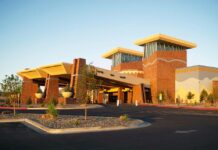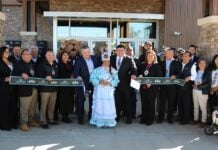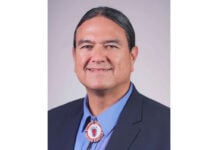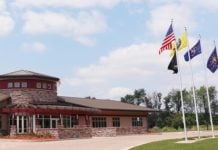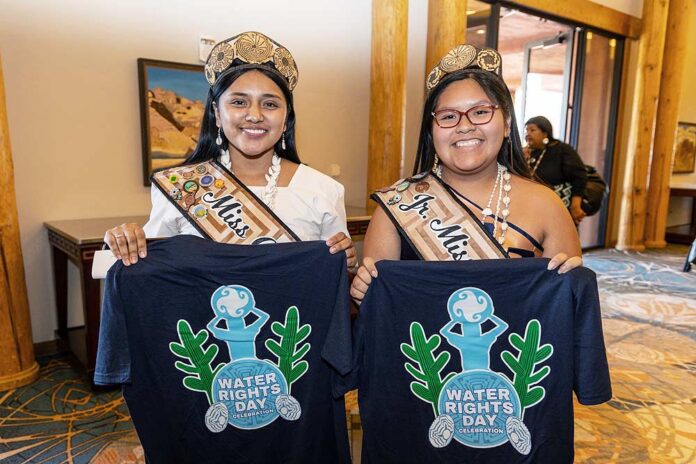SACATON, AZ – The Gila River Indian Community (GRIC) recently commemorated the 20th anniversary of the historic Water Rights Settlement Act of 2004 at the Sheraton Grand at Wild Horse Pass. This year’s Water Rights Day celebration brought together tribal leaders, elders, veterans, and youth, along with key figures who played critical roles in achieving the landmark agreement.
GRIC Gov. Stephen Roe Lewis honored the legacy of tribal leaders who worked for decades to reclaim the community’s water rights and set the course for its future. “This was not just about water – it was about justice,” said Gov. Lewis.
Gov. Lewis paid tribute to his late father, Rodney Lewis, a principal architect of the settlement, describing him as a “special water warrior for our people” whose perseverance and vision paved the way for success. “Just because we did it, does not mean it wasn’t impossible to do when we set out,” said Gov. Lewis.
Arizona Gov. Katie Hobbs joined the celebration, proclaiming Dec. 10, as Gila River Indian Community Water Rights Day statewide, honoring the GRIC’s achievements and ongoing leadership in water stewardship. The event also featured prominent leaders who have helped establish and maintain the community’s water rights, including former U.S. Sen. Jon Kyl, former Community Gov. Richard Narcia, and Tom Buschatzke, Director of the Arizona Department of Water Resources.
GRIC Lt. Gov. Regina Antone welcomed attendees, emphasizing the importance of uniting elders, veterans, and youth to celebrate the community’s progress. “This day reminds us of where we came from, what we have achieved, and the journey that still lies ahead,” said Antone.
The 2004 settlement secured 653,500 acre-feet of water annually, one of the largest tribal water settlements in U.S. history.
Gov. Lewis highlighted its transformative impact, enabling the community to rebuild its agricultural economy, restore its cultural connection to water, and develop sustainable infrastructure. Projects like the MAR 5 groundwater recharge facility and the innovative solar-over-canals project would not have happened without the 2004 settlement, Lewis said.
President Joe Biden, who visited Gila River in October, sent a letter to the community to honor the day. “The lands and waters stewarded by tribal nations carry so much promise: helping protect us against climate change, providing the clean air we breathe and clean water we drink, and sustaining the livelihoods of ranchers, outfitters, guides, and rural and Indigenous communities,” Biden wrote. “The Arizona Water Settlements Act is a crucial part of this effort – ensuring vital water access for the Gila River Indian Community.”
Gov. Lewis also addressed the challenges the community has faced since the settlement’s enactment, including legal battles to protect water rights and emerging threats from the ongoing mega-drought affecting the Colorado River Basin. He pointed to the Bipartisan Infrastructure Law of 2021, which provided over $200 million to secure affordable CAP water delivery, as a recent victory for the community.
“Our water journey is ongoing and may never truly end,” said Gov. Lewis. He outlined a forward-looking strategy focused on stabilizing in-state water supplies, such as the Gila and Verde Rivers, and leveraging groundwater resources. “We must continue the sacred journey our ancestors started,” he said. “This community is ready.”
The celebration also highlighted the role of partnerships, with Lewis recognizing both the Gila River Community Council and the 38 Sovereigns Council – a coalition of tribal and Colorado River state leaders – for their unwavering commitment to protecting water rights. Council members stood to receive applause for their leadership and dedication.
The Water Rights Day events also included a 24-mile run from District Seven to the Huhugam Heritage Center on Maricopa Road. The run included about 20 community members, including young runners from the Akimel O’odham/Pee Posh Youth Council. As Water Rights Day drew to a close, Gov. Lewis reminded attendees that the community’s water agreement was not an endpoint, but a milestone and a beginning.
“We have respected the traditions of our ancestors by innovating in the face of crisis, just as they did,” said Gov. Lewis. “We will remain Gila River Strong.”





